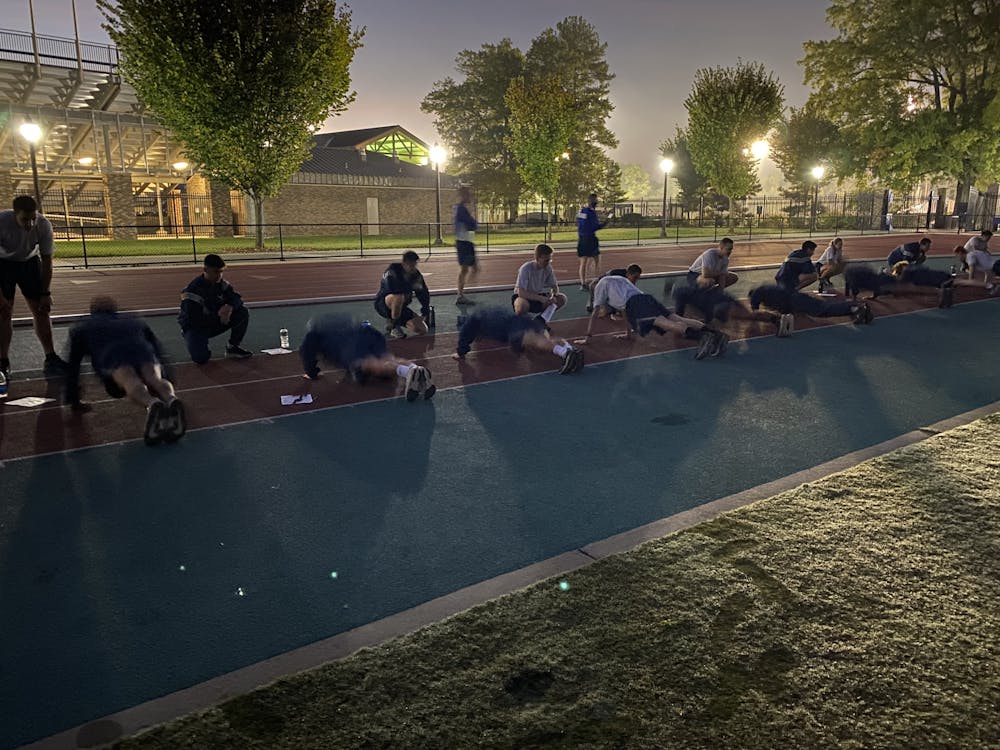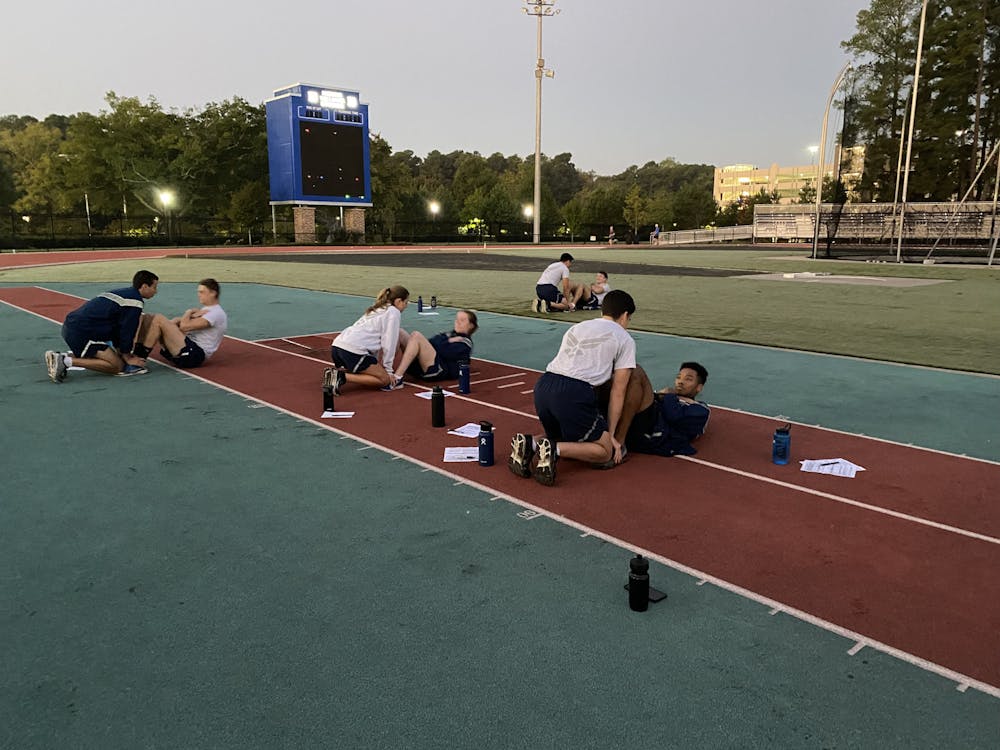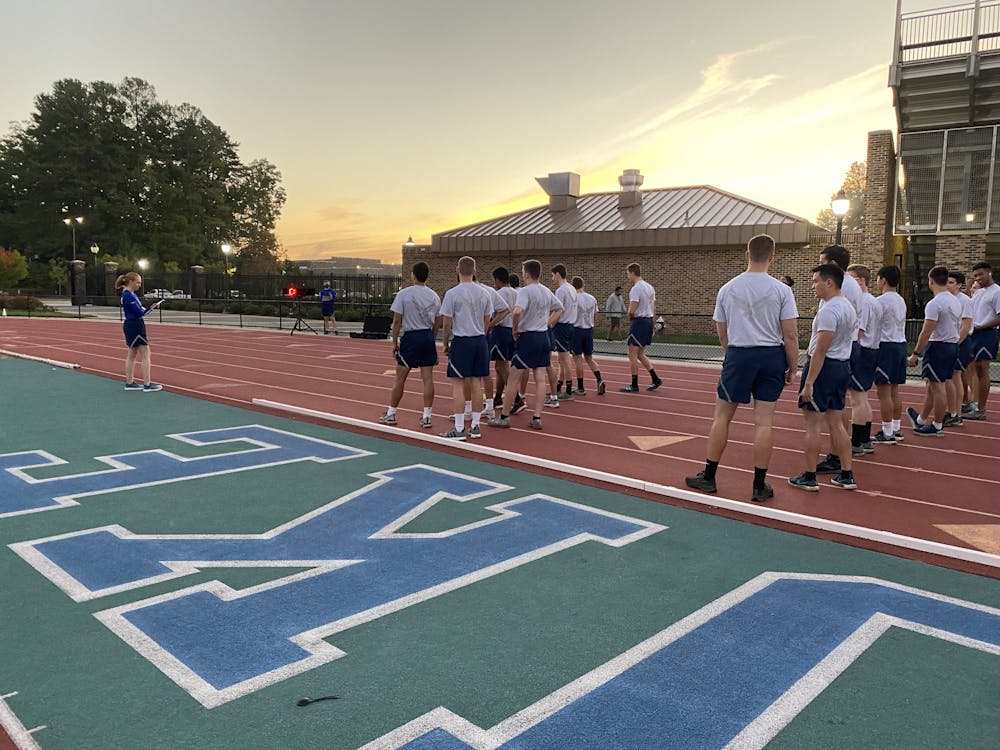Before dawn on a recent Thursday, cadets in Duke’s Air Force Reserve Officer Training Corps lined up in the Morris Williams Track & Field Stadium to warm up for their physical fitness test, a once-a-semester event critical for their future as cadets.
“It’s especially important for our sophomores,” said senior Cami Bowen, a cadet wing commander. “They compete for slots to go to field training.”
Field training is a two-week program at Maxwell Air Force Base, in which cadets are tested on everything they learned in their first two years of ROTC. To earn a slot, the cadets are evaluated based on their performance on the physical fitness test, their GPAs and the rankings assigned to them by their commander.
During the fitness test, the cadets were told to do as many push-ups as possible in a minute, as many sit-ups as possible in a minute and a timed 1.5 mile run. They were assigned a score out of 100 based on their results in the test as well as their body weight and height.
“One more, one more, one more,” cadets shouted to fellow cadets doing push-ups or sit-ups.
The cadres—Michael Nishimura, lieutenant colonel and visiting professor in Air Force ROTC; Nethania Swanson, captain and visiting assistant professor in the Air Force; Joseph Tompkins, captain and visiting assistant professor in the Air Force ROTC; and technical sergeant Jodie Vahle—applauded them at the end of workouts.
“Great job! Push it out.”
“We really try to get [their scores] above ... 95-96, and all of them for the most part are there,” Bowen said.

Weekly activities and time management
Most Duke students juggle classes, club meetings and pre-professional networking. But a select group of students must also make time for field training, military classes and predawn workouts. Duke’s Army and Air Force ROTC cadets describe their military programs as challenging but also as significant sources of community.
Every week, ROTC students wake up as early as 5 a.m. to start working out by 6 a.m.. They are also required to attend a weekly leadership lab class, among other activities such as outdoor retreats.
“We did the math and it was like 20 or so hours a week on different ROTC things,” said sophomore Clay Bromley, a midshipman.
This is on top of Bromley’s time-consuming coursework as a double major in electrical and computer engineering and computer science.
“I like to joke that I do ROTC during the day and then Friday at night. I just never sleep,” Bromley said. “But it definitely teaches you to get good at planning out your time and being able to fit the activities in, which is a very important skill to have when you’re actually in the military.”
Senior Jimmy Xiao has had a similar experience as an electrical and computer engineering major, resident assistant and Air Force ROTC special projects officer.
“It can be a little rough sometimes trying to juggle everything,” he said. But as a senior, he’s “gotten used to it.”
Navigating environments and building community
Besides time management, ROTC has taught Xiao how to code-switch.
Immersed in both academic and military environments, cadets have to navigate between three modes: life as a college student, being in ROTC but in a “locked off” classroom manner with minimal military decorum and being in ROTC in a fully “locked on” military manner with marching and strict procedure, Xiao said.
“It takes a bit of mental work to figure out … whether [an ROTC activity] was locked on or locked off during the program,” Xiao said. “I think it’s just a social learning experience like any part of college. You just try to use your social skills to figure out what’s appropriate for the time and what’s not.”
Sometimes these different modes intersect. Xiao said he has had funny interactions while taking a shortcut through Duke Hospital to get to class.
“I often get thanked for my service in the hospital, which is kind of weird, because I’m not actually active duty or anything,” Xiao said.
This kind of code-switching can be difficult to navigate, but upperclassmen cadets try to explain things to first-years so they “aren’t super confused and don’t have to go through this whole song and dance,” Xiao said.
Sophomore Violet Wang, a cadet in Army ROTC, is thankful for this kind of mentorship.
“Being in Army ROTC can be really confusing, especially when you’re talking about career paths,” Wang said. “That was really nice that they have a little structure for you to receive mentorship and also have the community of your little family there.”
Upperclassmen like Bowen have worked hard to create a sense of family within their branches.
“Because we’re in a military setting, sometimes it can feel a little harsh. And that’s something that I know I have been working on,” Bowen said. “That was really my main goal for this year, that we’re taking care [of] especially our [first-years] that are new to college and getting their feet under them.”
Army ROTC builds community through its biannual field training exercises, which take place in the Eno Forest. Last year, Wang and the rest of her branch camped there for two nights and learned how to sleep outside, utilize critical survival skills and communicate effectively for their missions.
“Being able to have experiences not by yourself but with the battalion, and being able to talk with upperclassmen and learn from them but also interact with people from my class, made the experience a lot more tight-knit and family-like,” Wang said.

‘Service was just the obvious choice to give back’
Cadets join ROTC for a variety of reasons. For Wang, Army ROTC is a step towards her goal of having a career after graduation that allows her to serve her country.
“I’m an immigrant, and I would say that I’m really thankful for all the opportunities that I’ve been able to have in the United States, and being able to be a citizen here, I’m really thankful for everything that the country has given me,” Wang said. “For me, service was just the obvious choice to give back.”
Bromley said that originally decided to join because he is part of a military family. His step-dad was in the Marine Corps and inspired him by sharing stories about the military being a family filled with people from unique backgrounds.
“I have military in my family, so I knew I wanted to do some kind of service in that regard, and this will allow me to have the benefits of ROTC while also having a guaranteed job in the field that I want to go in, which is defense,” Bromley said.
Xiao joined ROTC because he is fascinated with U.S. politics and foreign policy. He said he has spent a lot of time studying case studies where the U.S. military “screwed up,” like the My Lai massacre during the Vietnam War and Haditha massacre in Iraq. He wants to help prevent future events like those from occurring.
“I want to be part of the positive side of leadership in the military and make sure things are done right and then also give back to this country because I do love this country,” Xiao said.
Get The Chronicle straight to your inbox
Signup for our weekly newsletter. Cancel at any time.

Ayra Charania is a Trinity junior and a senior editor of The Chronicle's 118th volume.

